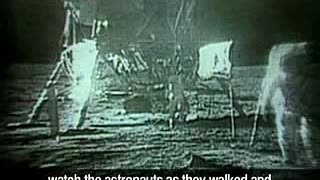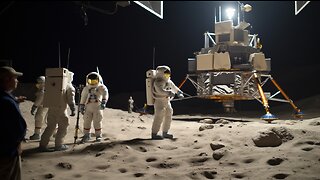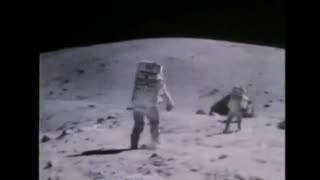Apollo 11:Landing on Moon
Apollo 11 was the first mission in human history to successfully land astronauts on the Moon. The mission was conducted by NASA, the United States' space agency, and it remains one of the most significant achievements in space exploration.
Here's a brief overview of the Apollo 11 mission and its historic landing on the Moon:
Launch and Crew:
Apollo 11 was launched on July 16, 1969, from Kennedy Space Center in Florida, USA, using the Saturn V rocket. The crew consisted of three astronauts:
Neil Armstrong, mission commander
Edwin "Buzz" Aldrin, lunar module pilot
Michael Collins, command module pilot
Lunar Module Descent:
The lunar module, named "Eagle," separated from the command module in lunar orbit and began its descent to the Moon's surface on July 20, 1969. Neil Armstrong and Buzz Aldrin were inside the lunar module while Michael Collins remained in the command module, orbiting the Moon.
Lunar Landing:
As the lunar module descended, Armstrong and Aldrin encountered a number of challenges, including an unexpectedly rocky landing site with boulders. With only seconds of fuel remaining, Armstrong took over manual control and guided the lunar module to a safe landing spot in the Sea of Tranquility, a region on the Moon's surface.
First Steps on the Moon:
Neil Armstrong stepped onto the lunar surface on July 20, 1969, and famously said the iconic words, "That's one small step for [a] man, one giant leap for mankind." Buzz Aldrin joined him shortly after, and together they conducted various scientific experiments, collected samples, and planted the American flag on the Moon.
Return and Legacy:
After spending about 21 hours on the lunar surface, Armstrong and Aldrin returned to the lunar module, and they eventually rejoined Collins in the command module. The astronauts then began their journey back to Earth, splashing down safely in the Pacific Ocean on July 24, 1969.
The success of the Apollo 11 mission marked a monumental achievement in human history and demonstrated the capabilities of human space exploration. It showcased the United States' determination to achieve President John F. Kennedy's goal of landing a man on the Moon before the end of the 1960s.
The Apollo 11 mission continues to serve as an inspiration for future generations of space explorers and researchers, highlighting the potential of human ingenuity, determination, and collaboration in the pursuit of scientific and technological advancements.
-
 6:44
6:44
DocumentariesBrainFood
10 months agoApollo 11 Moon Landing
47 -
 0:09
0:09
Fun Facts
8 months agoApollo and the Moon
2 -
 0:36
0:36
NASA Apollo Hoax
1 year agoApollo 17 liftoff from the moon
3231 -
 6:14
6:14
QTHELIGHT PODCAST
1 year agoMOON LANDING
282 -
 57:44
57:44
Outer Space
1 year agoThe Journeys of Apollo to the Moon
35 -
 5:46
5:46
Nasa Adventures
6 months agoApollo 8 Around The Moon and Back
36 -
 4:19
4:19
OP Freedom
2 years agoHoaxed moon landing
2.35K10 -
 52:27
52:27
Flat Earth Fact or Fiction
1 year agoThe First Moon Landing Fact or Fiction
619 -
 8:09
8:09
YHVHHAVEMERCY
1 year agoTHE APOLLO MOON LANDINGS HOAX -THE INCONVENIENT TRUTH
861 -
 12:30
12:30
Flat Earth Fact or Fiction
4 months agoThe Best Moon Landing
1.2K1